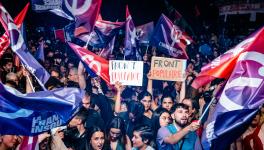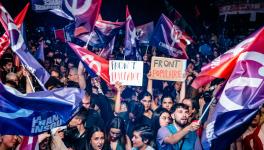Defying Police Repression, High School Students Continue Protest in France

The Yellow Vest protests in France garnered a lot of media attention over the past few weeks. At the same time, another protest which went relatively unnoticed involved thousands of high school students, who were out on the streets, agitating against the policies of Emmanuel Macron’s regime. These include changes in the French exam system, as well as the recent announcements hiking the exam registration fees for non-EU students. According to reports, on December 11, up to 450 high schools (lycées) across France remained totally or partially shut as students observed “Black Tuesday”. Student organizations, including Étudiants Communistes (EC), FIDL and UNL-SD, are actively engaged in organizing the protests.
A report by FRANCE 24 said that high-school students were infuriated by Macron’s plans to change the end-of-school exam, known as the Baccalaureate or ‘bac’, and replace the broad subject areas that students currently choose from (science, literature, or social sciences) with more specific courses. They are also demanding the repeal of a reform, passed last year, which introduces stricter selection criteria for university. Critics are of the opinion that the government’s moves will generate inequality between students in the ‘rich’ schools and the ‘poorer’, peripheral ones. They also opposed plans for national civic service for French youths, due to be rolled out in 2026.
Étudiants Communistes (EC) (Union of Communist Students) demanded a free and open university, reinvestment of 2 billion euros per year in higher education, and a Multi-Year Residence Title for every student. This residency permits foreign students to continue to stay and study in France after the expiration of their long-stay student visa for the number of years remaining in their education program.
The Mouvement Jeunes Communistes de France (MJCF), or the Movement of Young Communists, also stood in solidarity with the students and issued a statement, making various demands, such as repealing the Orientation et Réussite des Étudiants (ORE) law. This law imposes a selection process for courses which are higher in demand using a new digital platform, named Parcoursup. It functions by allowing universities to decide whether to accept or reject eligible students based on “previous training” and “ability”.
Another demand made by the organization was that everyone should be able to access public training, with no other condition than the required diplomas. And this training should be free for all, with all the required materials being provided to the students, the organization said.
Along with this, the group demanded that the government allow people who were forced to leave training mid-way to be able to return and complete their course.
The statement said, “[We want] The right to return to training because too many young people are forced to leave school early without being able to return easily if they wish. We claim the right to lifelong learning.”
There are reports of the protesting students being brutally repressed by the police at various places. On December 7, police officials rounded up students of St Exupéry High School in Mantes-la-Jolie and forced them to kneel down with their hands on their heads. This act by the French police was met with widespread condemnation. The student community has reacted by organizing kneel down protests throughout the country. There are also reports of around 300 French high schools being barricaded every day last week.
MJCF said, ““The accusations of violence made by the government against mobilized high-school students are unfounded. In the overwhelming majority of mobilized high-schools, the students did not show any violence. In contrast, what is systematic is the violence by the police. The right of students to protest must be guaranteed and violence must stop.”
“The government must attend to the expectations of the youth who are mobilizing. The protests against the reform of bachelor’s degrees and selection for the access to universities proves that the government has failed to address the expectations of the youth. The youth have rejected the general [culture of ]competition between schools and between students. The government must hear this message and modify its policy,” the organization added.
“There have been many mobilizations over several days in numerous universities, protesting the rise in registration fees for foreign students. Various university presidents have also spoken against this strange signal of inequality sent to the world. On this subject too, the government must listen and withdraw the announced raise,” MJCF declared.
In an interview with FRANCE 24, Robi Morder, the head of GERME (Study and Research Group on Student Movements) at Sciences-Po, Paris, said that, “If the student movement has taken hold, it is in part thanks to the Yellow Vests.”
Morder pointed out that the protesters in both the cases come largely from peripheral areas and small towns that are deprived of public services and jobs, and feel abandoned by Parisian elites. He added that although the demands of the students are specific, “their discontent expresses a more deep-seated anxiety, about jobs in particular, and a fear of the future… In this respect, [education minister] Jean-Michel Blanquer is wrong to claim there is no link between the students and the Yellow Vests. He does not understand that the students in the street are the children of the Yellow Vests.”
The Yellow Vests movement has led to unprecedented levels of mobilization in French society, involving hundreds and thousands of participants, largely from the working and poor middle classes who are engaged in all kinds of work, from the IT sector to factories. These sections have faced the brunt of the rising costs of living and the depreciating quality and availability of public services in the country.
Even though Emmanuel Macron made a couple of appearances on TV last week to declare waivers and roll backs of hikes in fuel price to placate the protesters, the issues raised by the high school students remain unaddressed. MJCF called for mobilization on December 13th against this rise in registration fees, and on the 14th alongside employees to bend the government.
Get the latest reports & analysis with people's perspective on Protests, movements & deep analytical videos, discussions of the current affairs in your Telegram app. Subscribe to NewsClick's Telegram channel & get Real-Time updates on stories, as they get published on our website.
























